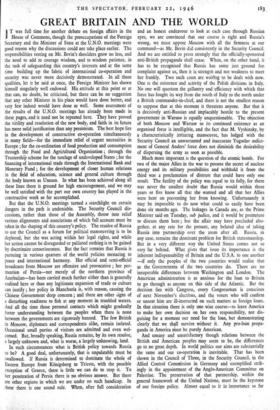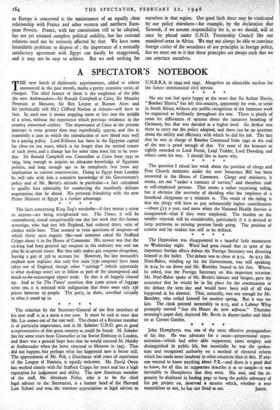GREAT BRITAIN AND THE WORLD
I T was full time for another debate on foreign affairs in the House of Commons, though the preoccupations of the Foreign Secretary and the Minister of State at the U.N.O. meetings were good reason why the discussions could not take place earlier. The responsibilities resting on Mr. Bevin's shoulders grow no less, and the need to add to courage wisdom, and to wisdom patience, in the task of safeguarding this country's interests and at the same time building up the fabric of international co-operation and security was never more decisively demonstrated. In all those qualities, let it be said at once, the Foreign Minister has shown himself singularly well endowed. His attitude at this point or at that can, no doubt, be criticised, but there can be no suggestion that any other Minister in his place would have done better, and very few indeed would have done as well. Some assessment of the fesults of the U.N.O. meetings has already been made in these pages, and it need not be repeated here. They have proved the virility and resolution of the new body, and faith in its future has more solid justification than any pessimism. The best hope lies in the development of constructive co-operation simultaneously in many fields—for the immediate relief of urgent necessities in Europe ; for the co-ordination of food production and consumption through the Food and Agricultural Organisation ; through the Trusteeship scheme for the tutelage of undeveloped States ; for the financing of international trade through the International Bank and Monetary Fund ; for the development of closer human relations in the field of education, science and general culture through the body known as Unesco. In what has been achieved along all these lines there is ground for high encouragement, and we may be well satisfied with the part our own country has played in the constructive work so far accomplished.
But that the U.N.O. meetings turned a searchlight on certain dangers in the path is undeniable. The Security Council dis- cussions, rather than those of the Assembly, throw into relief various alignments and associations of which full account must be taken in the shaping of this country's policy. The resolve of Russia to use the Council as a forum for political manoeuvring is to be deplored, but she was acting within her legal rights, and while her action cannot be disregarded or palliated nothing is to be gained by doctrinaire censoriousness. But the fact remains that Russia is pursuing in various quarters of the world policies menacing to peace and international harmony. Her official and semi-official broadcasts from Moscow are offensive and provocative ; her per- meation of Persia—not merely of the northern province of Azerbaijan—has been carried much further either than is generally realised here or than any legitimate expansion of trade or culture can justify ; her policy in Manchuria is, with reason, causing the Chinese Government deep concern ; and there are other signs of a disturbing readiness to fish at any moment in troubled waters. And all the time those personal contacts which might gradually foster understanding between the peoples when there is none between the governments are rigorously banned. The few British in Moscow, diplomats and correspondents alike, remain isolated. Occasional small parties of visitors are admitted and even wel- comed. But, broadly speaking, Russia remains, by its own resolve, a largely unknown and, what is worse, a largely unknowing, land. In such circumstances what is British policy towards Russia to be? A good deal, unfortunately, that is unpalatable must be swallowed. If Russia is determined to dominate the whole of Eastern Europe from Konigsberg to Trieste, with the possible exception of Greece, there is little we can do to stop it. To her penetration of Persia there is no obvious answer. But there are other regions in which we are under no such handicap. In these there is one sound rule. When, after full consideration and an honest endeavour to look at each case through Russian eyes, we are convinced that our course is right and Russia's wrong, we must oppose Moscow with all the firmness at our command—as Mr. Bevin did consistently in the Security Council. And we are entitled to press strongly that the officially-sponsored anti-British propaganda shall cease. When, on the other hand, it has to be recognised that Russia has some just ground for-, complaint against us, then it is strength and not weakness to meet her frankly. Two such cases are waiting to be dealt with now. One is the existence and activity of the Polish divisions in Italy. No one will question the gallantry and .efficiency with which that force has fought its way from the south of Italy to the north under a British commander-in-chief, and there is not the smallest reason to suppose that at this moment it threatens anyone. But that it is decisively anti-Russian and implacably hostile to the present government in Warsaw is equally unquestionable. The objection of both Moscow and Warsaw to its continued existence as an organised force is intelligible, and the fact that M. Vyshinsky, by a characteristically irritating manoeuvre, has lodged with the Security Council an unwarranted and inaccurate Yugoslav indict- ment of General Anders' force does not diminish the desirability of dispersing the army as soon as possible.
Much more important is the question of the atomic bomb. For two of the major Allies in the war to possess the secret of nuclear energy and its military possibilities and withhold it from the third was a proclamation of distrust that could have only one result. The futility of the policy was equal to its folly, for there was never the smallest doubt that Russia would within three years or five know all that she wanted and all that her Allies were bent on preventing her from knowing. Unfortunately it may be impossible to do now what could so easily have been done six months ago. The leakages in Canada are, as the Prime Minister said on Tuesday, sub judice, and it would be premature to discuss them here ; but the affair may have precluded alto- gether, at any rate for the present, any belated idea of taking Russia into partnership over the atom after all. Russia, in any case, remains the dominant problem for British statesmanship. But in a very different way the United States comes not so very far behind. What gives that issue its importance is the inherent indispensability of Britain and the U.S.A. to one another —if only the peoples of the two countries would realise that as the Governments of the two countries do. There are no insuperable differences between Washington and London. The American administration is as anxious for the loan to Britain to go through as anyone on this side of the Atlantic. But the decision lies with Congress, every Congressman is conscious of next November's elections, and the voters who will confirm or unseat him are ill-instructed on such matters as foreign loans. In that situation there is only one wise course—to leave America to make her own decision on her own responsibility, not dis- guising for a moment our need for the loan, but demonstrating clearly that we shall survive without it. Any pro-loan propa- ganda in America must be purely American.
And uneasy and unsatisfactory though relations between the British and American peoples may seem to be, the differences go to no great depth. In world politics our aims are substantially the same and our co-operation is inevitable. That has been shown in the Council of Three, in the Security Council, in the Allied Control Commission in Germany and exemplified strik- ingly in the appointment of the Anglo-American Committee on Palestine. The preservation of that partnership, within the general framework of the United Nations, must be the keystone of our foreign policy. Almost equal to it in importance so far as Europe is concerned is the maintenance of an equally close relationship with France and other western and northern Euro- pean Powers. France, with her constitution still to be adopted, has not yet attained complete political stability, but her external relations need not be seriously affected by that. We have some formidable problems to dispose of ; the importance of a mutually satisfactory agreement with Egypt can hardly be exaggerated, and it may not be easy to achieve. But we seek nothing for ourselves in that region. Our good faith there may be vindicated by our policy elsewhere—for example, by the declaration that Sarawak, if we assume responsibility for it, as we should, will at once be, placed under U.N.O. Trusteeship Council like our mandated areas in Africa. We may not always be able to convince foreign critics of the soundness of our principles in foreign policy, but we must see to it that those principles are always such that we can convince ourselves. •































 Previous page
Previous page